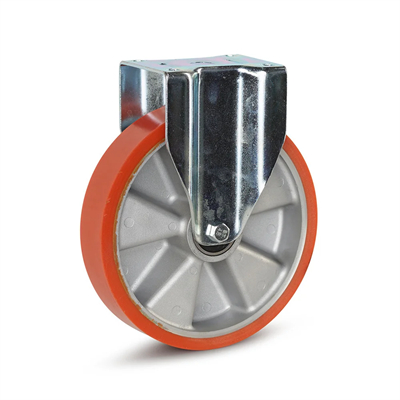Casters play a crucial role in material handling across various industries, facilitating the movement of goods, equipment, and products. Their importance in this context cannot be overstated. Here are the key roles casters play in material handling:
- Mobility: Casters provide mobility to equipment and devices, allowing them to be easily moved from one location to another. This is particularly valuable in settings like warehouses, factories, hospitals, and retail spaces, where materials need to be transported efficiently.
- Maneuverability: Swivel casters, in particular, offer excellent maneuverability. They can pivot a full 360 degrees, making it easy to navigate through narrow aisles, around corners, and in confined spaces. This precise control is vital for safely moving materials and equipment.
- Load Distribution: Casters distribute the weight of the load evenly across the wheels. This even weight distribution prevents strain on individual wheels, maintains stability, and ensures that materials are moved safely.
- Variety of Wheel Types: Casters are available with a range of wheel materials, including rubber, polyurethane, metal, and more. These materials can be chosen based on the specific flooring and load requirements of the application, providing durability and floor protection.
- Floor Protection: Many caster wheels are designed to protect flooring surfaces from damage. For example, soft rubber or polyurethane wheels are used to prevent scuffs and scratches on delicate floors.
- Noise Reduction: Some caster materials and designs are optimized for noise reduction, which is especially important in quiet environments like hospitals, libraries, and offices. Noise-reducing casters contribute to a more pleasant work environment.
- Versatility: Casters come in various sizes, weight capacities, and designs, making them adaptable to a wide range of applications. Whether it’s a small cart in a retail store or a heavy-duty conveyor system in a manufacturing plant, there is a caster solution available.
- Stability and Safety: Casters contribute to the stability and safety of equipment and materials during handling. Casters can be equipped with locking mechanisms to immobilize equipment when necessary, preventing unintended movement and accidents.
- Customization: Some caster manufacturers offer customization options to tailor casters to specific needs. This includes options for wheel size, material, and brake systems to suit the requirements of the application.
- Ease of Maintenance: Properly maintained casters provide smooth operation and long service life. Routine cleaning and lubrication of wheel bearings are key maintenance tasks to ensure caster performance.
- Efficiency: Casters improve the efficiency of material handling processes. They enable faster, more streamlined movement of materials, reducing manual labor and associated costs.
Whether it’s in a warehouse, a hospital, a factory, or a retail store, casters are essential for material handling. They provide the means to transport materials efficiently and safely, contributing to the overall productivity and functionality of various industries and applications.


